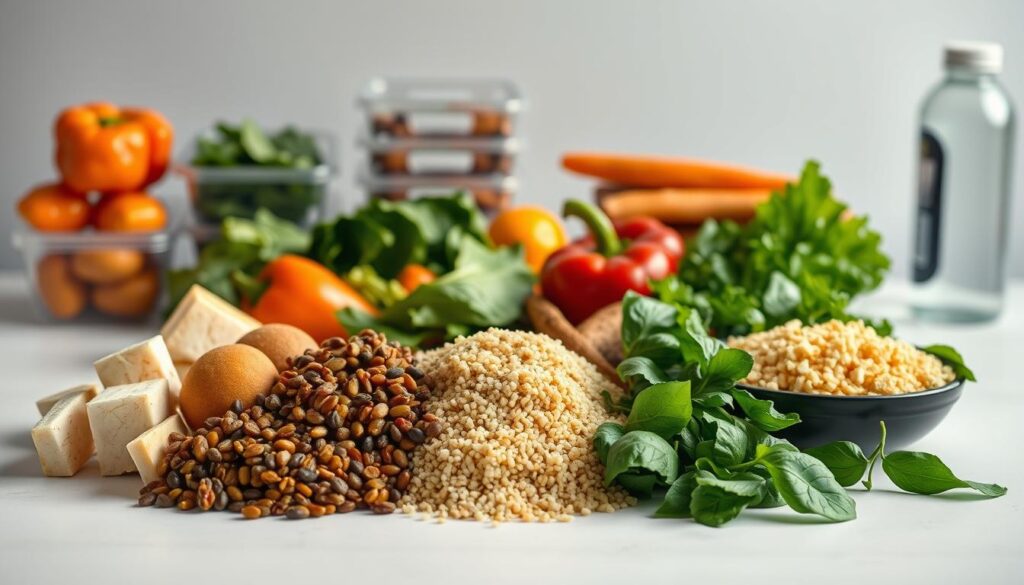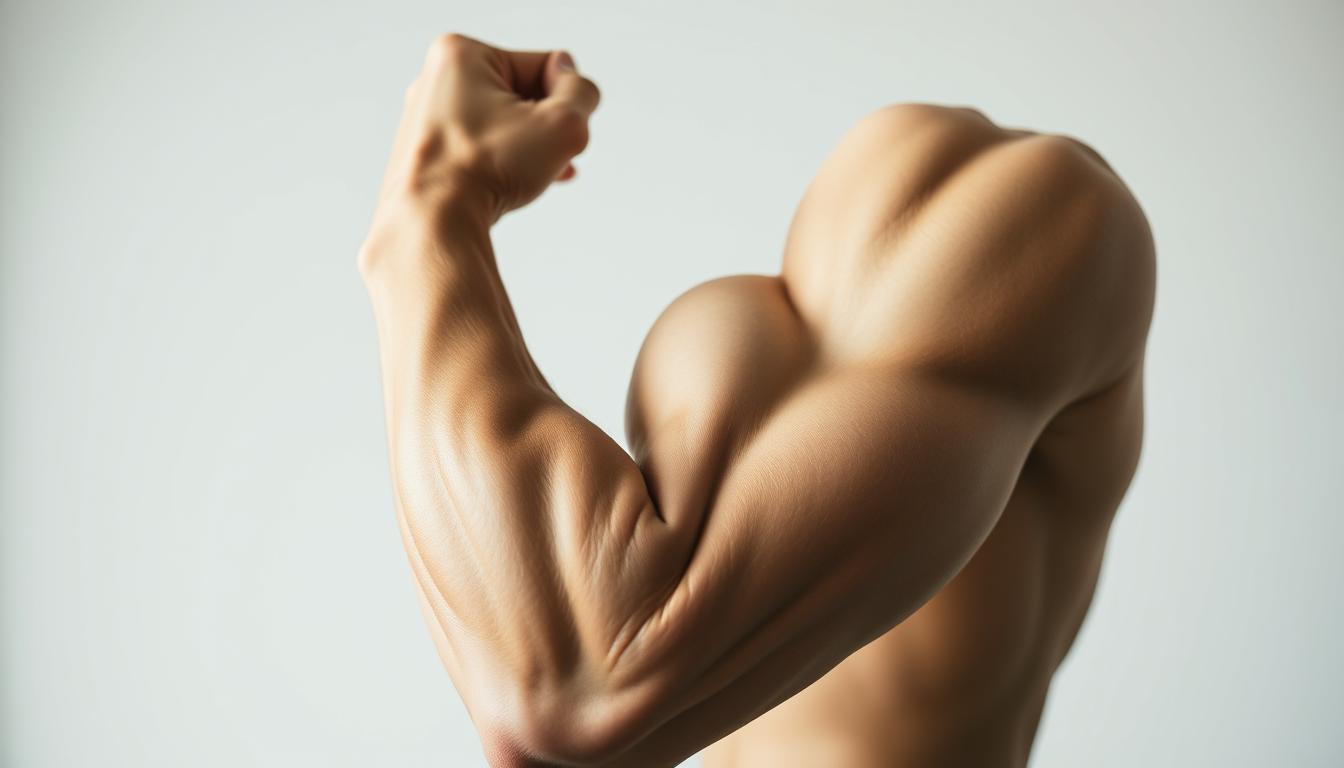Building muscle on a plant-based diet is a viable option for those looking to enhance their physique without consuming animal products. A well-planned vegetarian bodybuilding diet can provide the necessary nutrients for muscle growth and recovery.
For individuals new to bodybuilding, understanding the fundamentals of a vegetarian diet is crucial. This includes consuming sufficient protein, healthy fats, and complex carbohydrates to support muscle development.
Key Takeaways
- Understand the importance of protein in a vegetarian bodybuilding diet
- Learn how to balance macronutrients for optimal muscle growth
- Discover plant-based food sources for muscle building
- Explore tips for meal planning and preparation
- Find out how to monitor progress and adjust your diet accordingly
Understanding the Vegetarian Bodybuilding Diet for Beginners
Embarking on a vegetarian bodybuilding diet can be daunting, but with the right guidance, it’s entirely achievable. A well-planned vegetarian diet provides all the necessary nutrients for muscle growth and overall health.
The key to success lies in understanding the fundamentals of vegan bodybuilding nutrition and how to apply them effectively. This includes knowing the right foods to eat, how to balance macronutrients, and when to supplement.
Common Myths About Building Muscle on a Plant-Based Diet
One common myth is that a vegetarian diet lacks sufficient protein for muscle building. However, there are numerous vegetarian protein sources such as lentils, chickpeas, and tofu that can provide the necessary protein.
Another misconception is that plant-based diets are inherently weak in certain nutrients. While it’s true that vegetarians need to pay attention to their intake of certain nutrients like vitamin B12 and iron, a well-planned diet can mitigate these concerns.

Benefits of Vegetarian Bodybuilding
Adopting a meatless muscle building diet has several benefits, including lower risks of heart disease and certain cancers. Vegetarian diets tend to be high in fiber, antioxidants, and other nutrients that support overall health.
Moreover, a well-planned vegetarian bodybuilding diet can be rich in nutrients that support muscle recovery and growth, such as complex carbohydrates and healthy fats.
| Nutrient | Vegetarian Sources | Importance for Bodybuilding |
|---|---|---|
| Protein | Lentils, Chickpeas, Tofu | Essential for muscle repair and growth |
| Iron | Spinach, Beans, Fortified Cereals | Crucial for oxygen transport in the blood |
| Calcium | Milk, Fortified Plant Milk, Kale | Important for bone health |
Setting Realistic Expectations for Your Journey
It’s essential to set realistic goals when starting a vegetarian bodybuilding diet. Muscle growth takes time and patience, regardless of the diet type.
Understanding that progress may vary and being consistent with your training and nutrition plan will help you achieve your goals over time.
Essential Nutrients for Vegetarian Muscle Growth
Vegetarian bodybuilding demands a strategic approach to nutrition to support muscle development. A well-planned vegetarian diet can provide all the necessary nutrients for effective muscle growth, but it requires an understanding of the key nutrients and how to incorporate them into your diet.
Plant-Based Protein Sources and Requirements
Protein is a critical component of muscle growth, and there are numerous plant-based sources that can meet your protein needs. Legumes, beans, lentils, tofu, tempeh, and seitan are excellent sources of protein. Additionally, whole grains like quinoa and brown rice provide protein, making them valuable additions to a vegetarian bodybuilding diet.
Complete vs. Incomplete Proteins
Understanding the difference between complete and incomplete proteins is vital. Complete proteins contain all nine essential amino acids that the body cannot produce on its own. Quinoa and chia seeds are examples of complete proteins. Incomplete proteins, found in foods like beans and rice, lack one or more of these amino acids. However, by consuming a variety of plant-based foods, you can ensure you’re getting all the essential amino acids.
Protein Combining Strategies
Protein combining involves pairing different plant-based foods to provide all the essential amino acids. Traditional combinations include peanut butter on whole wheat bread or beans with rice. While it’s not necessary to combine proteins at every meal, consuming a variety of protein sources throughout the day can help meet your protein needs.
Crucial Micronutrients for Vegetarian Bodybuilders
Besides protein, several micronutrients are crucial for muscle growth and overall health on a vegetarian diet. These include iron, vitamin B12, zinc, and omega-3 fatty acids. Ensuring adequate intake of these micronutrients can help prevent deficiencies and support muscle recovery and growth.
Iron, B12, and Zinc: The Big Three
Iron, vitamin B12, and zinc are particularly important for vegetarians. Iron is found in beans, lentils, and dark leafy greens. Vitamin B12, crucial for nerve function and red blood cell formation, is found primarily in animal products, so vegetarians may need supplements or fortified foods. Zinc, essential for immune function and protein synthesis, is found in beans, nuts, and seeds.
Omega-3 Fatty Acids for Recovery
Omega-3 fatty acids support heart health and reduce inflammation, aiding in recovery after workouts. While the most well-known sources are fish and fish oil, vegetarians can obtain omega-3s from flaxseeds, chia seeds, and walnuts. Consider adding these foods to your diet or taking a vegetarian omega-3 supplement.
Supplements to Consider on a Vegetarian Bodybuilding Diet
While a well-planned diet should always be the primary source of nutrients, certain supplements can help fill any gaps. Consider a vegetarian protein powder, vitamin B12 supplement, or creatine monohydrate to support muscle growth and recovery. Always consult with a healthcare professional before adding new supplements to your regimen.
Creating Your Vegetarian Bodybuilding Meal Plan
To achieve your bodybuilding goals on a vegetarian diet, creating a tailored meal plan is crucial. This involves understanding your nutritional needs, planning your meals around your training schedule, and ensuring you’re consuming the right balance of macronutrients.
Calculating Your Caloric Needs
The first step in creating your meal plan is to calculate your daily caloric needs. As a vegetarian bodybuilder, you’ll need to consume enough calories to support muscle growth and recovery. A general rule of thumb is to consume an additional 250-500 calories above your maintenance level. Using a food diary or an app to track your daily caloric intake can help you stay on track.
Balancing Macronutrients for Optimal Muscle Growth
Balancing your macronutrients is vital for muscle growth. Your diet should consist of a balance of protein, carbohydrates, and healthy fats. Protein is particularly important for muscle repair and growth, and you should aim to consume 1.2-1.6 grams of protein per kilogram of body weight daily.
Carbohydrates: Timing and Sources
Carbohydrates are your body’s primary energy source. For bodybuilding, it’s essential to consume complex carbohydrates such as whole grains, fruits, and vegetables. Timing your carbohydrate intake around your workouts can help optimize performance and recovery.
Healthy Fats for Hormone Production
Healthy fats are crucial for hormone production and overall health. Include sources like nuts, seeds, avocados, and olive oil in your diet. Aiming for 0.5-1 gram of healthy fats per kilogram of body weight daily is a good starting point.
Sample Meal Plans for Different Training Days
Your meal plan should vary based on your training schedule. On high-volume training days, you’ll need more calories and protein to support muscle recovery and growth.
High-Volume Training Day Meal Plan
On high-volume training days, focus on consuming a balanced meal with protein, complex carbohydrates, and healthy fats within an hour after your workout. An example meal could be a protein shake with almond milk, banana, and almond butter, accompanied by a serving of brown rice and steamed vegetables.
Rest Day Nutrition Strategy
On rest days, your caloric needs may be lower, but it’s still important to consume enough protein to support muscle recovery. Adjust your carbohydrate and healthy fat intake based on your energy needs. A balanced meal plan on rest days could include oatmeal with fruit and nuts for breakfast, a quinoa salad with vegetables and tofu for lunch, and a lentil soup with whole grain bread for dinner.
Practical Tips for Vegetarian Bodybuilding Success
Achieving success in vegetarian bodybuilding requires a combination of proper nutrition, consistent training, and strategic planning. To support muscle growth and overall health, it’s crucial to focus on a well-balanced diet and effective meal planning.
Meal Prep Strategies for Busy Beginners
Meal prep is a game-changer for busy beginners in vegetarian bodybuilding. By preparing meals in advance, you can ensure you’re getting the right balance of nutrients. Start by planning your vegetarian fitness meal plan around your training days, focusing on protein-rich foods like lentils, chickpeas, and tofu. Cook in bulk and portion out your meals to save time during the week.
Eating Around Your Workouts
Nutrition around your workouts is critical for muscle recovery and growth. Consume a balanced meal with protein and complex carbohydrates 1-2 hours before your workout. After your training, refuel with a mix of protein and carbs within 30-60 minutes. For example, a post-workout smoothie with banana, spinach, and plant-based protein powder can be an effective recovery tool.
Overcoming Common Challenges
Vegetarian bodybuilding comes with its unique challenges, from managing hunger to eating out. Here are some strategies to help you stay on track.
Dealing with Hunger and Satiety
Managing hunger is key to sticking to your beginner bodybuilding diet. Incorporate high-fiber foods like vegetables, fruits, and whole grains to help you feel full. Additionally, include protein-rich foods at every meal to support satiety and muscle growth.
Eating Out While Staying on Track
Eating out doesn’t have to derail your vegan bodybuilding nutrition goals. Choose restaurants that offer plant-based options and don’t be afraid to ask for modifications to suit your dietary needs. Opt for dishes rich in protein and complex carbohydrates, and be mindful of portion sizes.
By implementing these practical tips, you can overcome common challenges and achieve success in your vegetarian bodybuilding journey. Stay consistent, be patient, and continually adjust your strategy as needed to support your goals.
Conclusion
A well-planned vegetarian bodybuilding diet is crucial for achieving fitness goals. By understanding the importance of a meatless muscle building diet, individuals can create a personalized plan that suits their needs.
Plant-based bodybuilding meals offer a variety of options for those looking to build muscle. Incorporating the right balance of protein, carbohydrates, and healthy fats is essential for optimal muscle growth.
A vegan weightlifting diet requires careful planning to ensure adequate nutrition. By focusing on whole, nutrient-dense foods and supplementing as needed, individuals can achieve their fitness goals.
With a clear understanding of the essential nutrients and meal planning strategies, individuals can confidently start their vegetarian bodybuilding journey. By making informed choices, they can achieve a strong and healthy physique.
